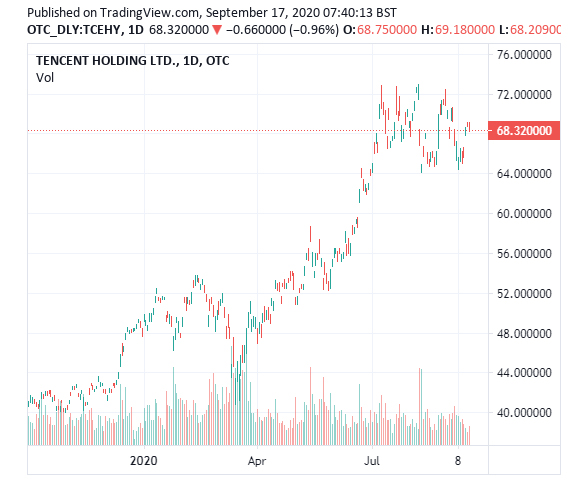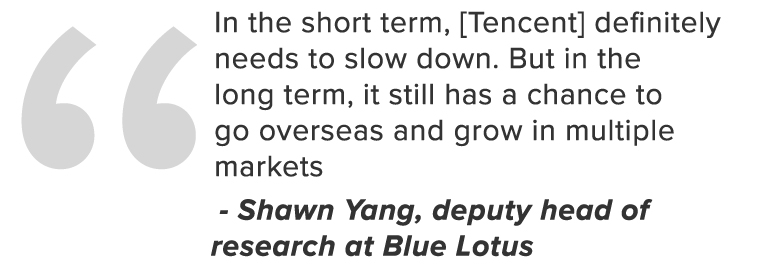
Thursday, September 17, 2020
Can Tencent’s share price level up after PUBG ban?
By Century Financial in 'Brainy Bull'


Tencent's [0700] share price has gained 38.5% so far this year (through 15 September’s close) as the tech company continues to deliver solid earnings results.
Powering the rise of Tencent’s share price has been revenue from online gaming, which grew 40% in the last quarter to come in at RMB38.29bn. Revenue from smartphone gaming came in at RMB35.99bn, a 62% year-on-year rise.
Tencent’s share price has also been supported by previous earnings reports. Overall, last quarter saw revenue come in at RMB114.88bn, beating analyst expectations of RMB112.72bn. That's a 29% jump from the same quarter last year and the biggest quarterly increase since Q2 2018.
That said, Tencent's share price dropped in September after India banned its gaming app PUBG Mobile. For investors, could this be the time to pick up a Chinese tech giant at a discount?


Why has Tencent's share price dropped?
Tencent's share price is being driven by its wildly popular mobile gaming apps. Top of the pile is Player Unknown's Battleground, or PUBG for short, a free-to-play online battle royale with worldwide sales in excess of $3bn.
India was one of its biggest markets, with over 175 million downloads. On 6 September, however, it was game over for PUBG players in the country when Indian authorities banned the game. This ban saw Tencent's share price drop 5%, followed by a $34bn loss in market cap within two days.


The move comes amid simmering geopolitical tensions between India and China. According to the Indian government, the app was “prejudicial to sovereignty and integrity of India, Defence of India, Security of State and Public Order.” Along with PUBG, authorities banned another 117 apps.
What now for Tencent's gaming ambitions?
In an email sent to S&P Market Intelligence, Lisa Hanson, president of market research firm Niko Partners said:
"We do not expect a significant material impact on [Tencent’s] revenue as India only accounted for 3% of the PUBG Mobile's [overseas] revenue in the past year."
While India might top downloads for the game, China is by far the biggest paying market. The country accounts for 52% of PUBG revenue, followed by the US which accounts for 14%. Most of this revenue is derived from in-app purchases.


Tencent itself has said that it plans to generate half of all online gaming revenue from overseas markets. However, expansion in the US could be challenging given current tensions between Beijing and Washington. Tencent could get around this is by forging partnerships with local publishers, for example, its tie-up with Activision to develop Call of Duty Mobile.
Shawn Yang, deputy head of research at Blue Lotus, told S&P Market Intelligence that the Middle East could also be a viable option for revenue expansion. The region has good mobile coverage and a strong demand for online games. The company could also focus its efforts on Southeast Asian countries, including Japan.
So, is Tencent a buy?
For now, Tencent’s share price will mostly likely be affected by how quickly it expands into overseas territories. While this could result in an initial slowdown in growth as it gets its strategy right, the pay-off could be worth it.
"We should not panic about the regulatory activities in India and the US," said Yang. "In the short term, [Tencent] definitely needs to slow down. But in the long term, it still has a chance to go overseas and grow in multiple markets".


Tencent's share price has an average 604.68 HKD target from the analysts tracking the stock on the Financial Times. Hitting this would see a 14.2% upside on the current price through 15 September’s close. Of the 46 offering recommendations, Tencent has 18 Buy ratings and 25 Outperform ratings.
For investors, Tencent’s share price as it stands could be an opportunity to buy shares at a discount before the price powers back up.
Source: This content has been produced by Opto trading intelligence for Century Financial and was originally published on cmcmarkets.com/en-gb/opto
Disclaimer: Past performance is not a reliable indicator of future results.
The material (whether or not it states any opinions) is for general information purposes only and does not take into account your personal circumstances or objectives. Nothing in this material is (or should be considered to be) financial, investment or other advice on which reliance should be placed. No opinion given in the material constitutes a recommendation by Century Financial or the author that any particular investment, security, transaction or investment strategy is suitable for any specific person.
Century Financial does not endorse or offer opinion on the trading strategies used by the author. Their trading strategies do not guarantee any return and Century Financial shall not be held responsible for any loss that you may incur, either directly or indirectly, arising from any investment based on any information contained herein.












